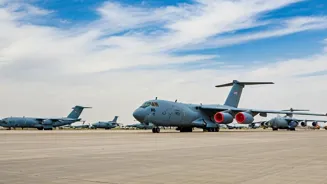India's Strategic Position
India's positioning in the ongoing Afghan situation reveals a strategic calculus shaped by evolving geopolitical considerations. It's crucial to understand
that India, Pakistan, and China have found common ground in opposing Trump's pursuit to regain control of the Bagram Air Base. This alignment reflects a convergence of interests, mainly related to stability in the region and their respective strategic objectives. The dynamics showcase how international relations are driven by intricate calculations and shifting alliances, especially in strategically important areas. The decision indicates a desire to prevent the United States from further entrenching its influence in Afghanistan, as they see it, and highlights a cautious approach to the evolving political landscape.
Trump's Base Ambitions
The demand for control over Afghanistan's Bagram Air Base by Trump is a crucial piece of the puzzle when deciphering the geopolitical complexities of the region. The Bagram Air Base has long been a strategic asset, and its possession offers considerable influence over the region. Trump's interest suggests an intent to reassert U.S. influence in Afghanistan and potentially counter growing influence of other regional powers. The motives are multifaceted, from military and strategic advantages to controlling and maintaining an influence over the political narrative in Afghanistan. The move, when seen within the wider framework of international relations, indicates a great effort to maintain a stronghold of the U.S. presence in the face of different regional objectives.
Neutralizing China's Influence
A significant reason behind the desire of the United States to reclaim Bagram Air Base is a strategic attempt to neutralize China's growing influence in the region. The U.S. perceives China's growing economic and diplomatic footprint in the area as a challenge to its own influence. By maintaining a presence, the U.S. can more effectively counterbalance China's growing influence and protect its interests. This dynamic underlines the ongoing strategic competition between the two superpowers and underscores the significance of Afghanistan as a crucial element in that competition. Such competition is often visible in various areas, ranging from infrastructure projects to diplomatic alliances.
















